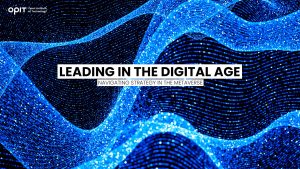Before the COVID-19 pandemic, most businesses viewed digitalization as only an additional avenue for marketing their products or services. In the post-pandemic world though, digitalization has become the very lifeblood of survival for these businesses.
But implementing an efficient digital business strategy is no easy task. After all, a digital transformation calls for fundamentally reshaping how a business operates.
However, one look at what technology can do for you and your business is enough to make you understand that the complex digital transformation process is well worth it. If all of this is new to you, don’t worry. You can master all the necessary digital skills to reap the benefits of digitalization by completing the Open Institute of Technology’s Bachelor’s Degree in Digital Business. Alternatively, you can further your skills with the Institute’s Master’s Degree in Applied Digital Business.
Without further ado, let’s discuss eight genuine benefits of embracing digitalization and implementing digital business strategies.
1. Data-Driven Decision-Making
Efficiency. Innovation. Sustainable success. These desirable outcomes can only be reached with data-driven decision-making. While traditional decision-making mostly relies on experience, modern data-driven decision-making leverages the power of artificial intelligence (AI) to analyze vast amounts of data swiftly and accurately.
Of course, artificial intelligence brings much more to the corporate world beyond data analysis. This innovative technology can automate administrative tasks, provide instant customer responses, and enhance overall operational agility. All of these make managerial and business decisions and processes significantly faster.
That’s precisely why OPIT’s study programs feature courses dedicated to artificial intelligence in the business setting, from a general introduction to AI principles in the digital economy. The goal of these courses is simple – help you understand why, how, and when to use AI in business decision-making and beyond.
But as powerful as AI is, you can’t solely rely on technology in your decision-making process. AI is only there to help you make this process more comprehensive and strategized. This technology will also help you spend less time on mundane, control-based tasks, allowing you to focus on your judgment, critical thinking, and problem-solving.
Luckily, all of these skills are also covered by various Digital Business courses at OPIT, allowing you to become the best digital-era manager and decision-maker you can be.
2. Faster Time to Market
All the invaluable data gathered by artificial intelligence and other digital tools can also do wonders in the research and development department. With so much data at hand, businesses should have no trouble improving their existing products or services or launching new ones.
The latter process is especially important as the time it takes for a product to go from conceptualization to market availability can be rather lengthy. But what used to take months or years can now be done in weeks, days, or even hours, all thanks to digitalization.
Businesses can rely on modern technologies to rapidly test, pilot, iterate, and launch new products and services, significantly enhancing their agility in the ever-evolving business world. And hey, if a product or a service doesn’t quite work, you’ll be able to tell this almost immediately through online feedback and product reviews.
Using these valuable insights, businesses can revise their offerings to suit their customers’ preferences, needs, and interests. The result? Nothing but product excellence and customer satisfaction.
3. New Sales Channels
Dominating the business world is all about finding new ways to reach, engage, and retain customers. The good news? The digital-age business world offers seemingly endless opportunities to do this. You just need to know where to look.
Granted, your job doesn’t stop when a new channel is identified. Rather, it transforms. Now, it’s up to you to know how to use that channel effectively. To do so, you’ll need to learn about digital business models, as virtually every sales channel has a dedicated one.
Arguably, the most important thing to cover is how digital business models differ from traditional models (especially if you’ve only ever worked with the latter). And that’s precisely what OPIT’s “Digital Business Models” module covers.
You’ll learn just how vital online platforms, e-commerce, and digital marketing are in shaping modern business strategies. Use this knowledge to successfully tap into new markets and connect with a broader audience.
Naturally, there’s one online channel that’ll play critical role here – social media. Luckily for business owners and managers, most customers are active on at least one social media platform, essentially making the global population a prospect for sales.
Check out OPIT degrees
-
Career aligned
-
Fully Online
-
EU-accredited institution
4. Increased Market Share
For most businesses, the ultimate goal is to boost revenue, improve bargaining power, and strengthen competitive position. First step? Capturing a more substantial portion of the market. Fortunately, doing so is much easier now that most of the global population is within reach through digital business strategies.
So, it’s no wonder digital transformation has become essential to growing a brand. This process facilitates everything you need to establish a robust market presence – better financial performance, media activity, and advertising capabilities.
Best of all? You can use digital business strategies to only boost your market share or completely dominate your industry. It’s all up to you and how you harness the power of digitalization.
That’s why OPIT’s Applied Digital Business program contains a course titled “Maximizing Impact in the Digital Economy.” From gradual scaling to growth hacking, this course equips you with the insights and skills needed to ensure sustained success in virtually any industry.
5. Better Customer Interaction
Reaching and retaining new customers are equally important. But how can you do this? By ensuring most (if not all) of their interactions with the business are positive, of course. Naturally, digital transformation can help in this regard as well.
After all, the digital environment offers countless possibilities for improving the customer relationship with a brand. From streamlined online transactions to personalized communication through various digital channels, there’s virtually no area of the customer experience that digital transformation can’t positively impact. With this process, it’s all about simplicity, real-time services, and tailored experiences. And there’s hardly a customer that doesn’t love these things.
Granted, many (digital) elements are involved in achieving this desirable outcome, including artificial intelligence, automation, and digital marketing. But don’t worry; the OPIT’s programs extensively cover each element.
Take digital marketing as an example. Whether you’re interested in gaining an understanding of the key concepts of this dynamic field or delving into advanced strategies, there’s a module tailored to your needs.
6. Real-Time Transactions
As previously mentioned, customers love real-time services. In the past, this was hardly possible, as businesses were limited by time and infrastructure constraints. But not anymore. With digital tools, the 24/7 concept becomes a reality.
Customers can look at business offerings and make a purchase at any time of the day or night, breaking free from the traditional constraints of operating hours. All they need is a few clicks, and voilà – their transaction is complete.
This is made possible by innovative technologies like Blockchain, which dramatically enhances transaction speed while minimizing costs and any chances of fraud. Of course, this also means that this technology is covered by OPIT’s undergraduate program, which looks into the Blockchain’s transformative impact on business practices.
7. Easy Talent Acquisition
So far, this article has focused on how digital business strategies can benefit a brand’s relationship with customers. But these strategies can also revolutionize the process of talent acquisition. Of course, this is equally important, as there’s no successful business without a talented and capable workforce.
Before, recruiting top talent was often a challenging and time-consuming endeavor. Now, attracting talent (and the right talent for your business at that) is almost effortless. How?
Well, digital tools have got your back every step of the way. From job-matching sites like LinkedIn attracting candidates based on their professional profiles to automated systems streamlining the hiring process, digital tools have completely transformed talent acquisition.
That’s not to mention the endless opportunities working from home has opened up both for businesses and employees. Thanks to digitalization, the whole world is basically your talent pool.
8. Higher Revenue
Though each of the mentioned benefits is essential for business success in and of itself, they also have a cumulative impact on one of the most crucial business metrics: revenue. Investing in digitalization might seem like a major undertaking, but this impact makes every penny worth it.
Let’s recap what you can get with effective digital business strategies. You can get more effective systems and productive employees, better decision-making and judgment, improved products and sales channels, and a long-lasting (and interactive) relationship with customers. All of these create a robust foundation for revenue growth.
Reap the Full Benefits of Digital Business Strategies
There’s no doubt about it – effective digital business strategies can transform the trajectory of virtually any business. But for these strategies to work, they must be carried out with precision, knowledge, and strategic foresight.
That’s where OPIT’s Bachelor’s Degree in Digital Business and Master’s Degree in Applied Digital Business come into play.
Regardless of the digital business career you’re interested in (e.g., digital business consultant, digital marketing specialist, or digital transformation specialist), these courses will equip you with the necessary skills to stay ahead in a globally connected world.
Check out OPIT degrees
-
Career aligned
-
Fully Online
-
EU-accredited institution








